More families refusing to donate relatives’ organs
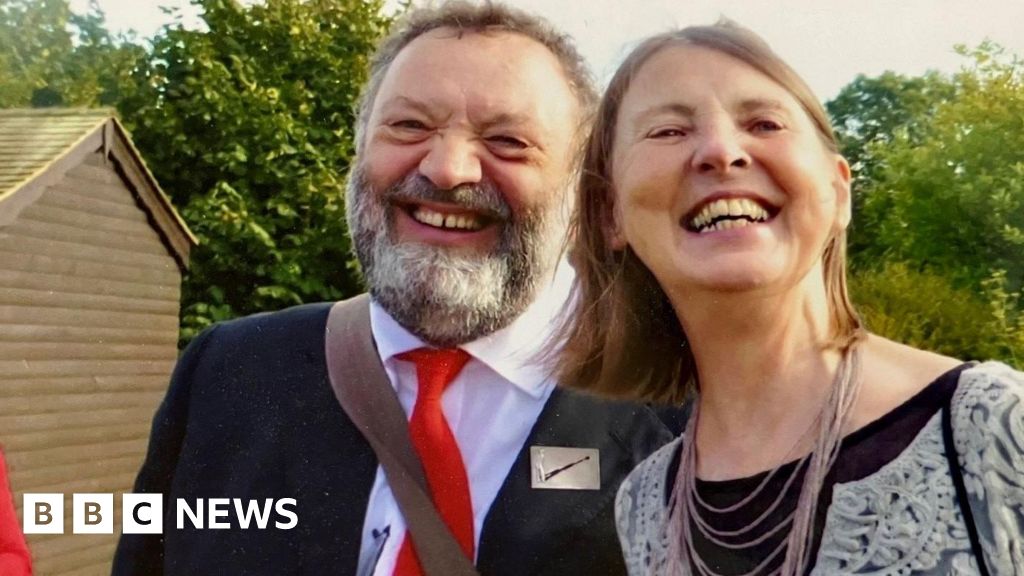
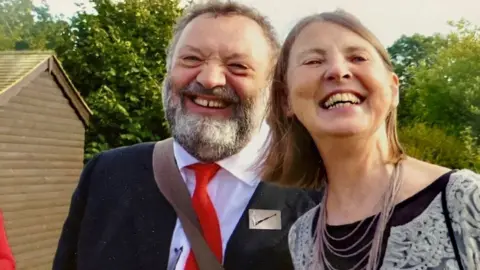 Lesley Clarke
Lesley ClarkeFamilies are increasingly turning down requests to donate a relative’s organs, sometimes because their loved one’s wishes were unknown. With the transplant waiting list at a 10-year high, the NHS is urging people to talk about what they would want.
“He was so much, so many things, a genuinely lovely man.” Lesley Clarke smiles as she remembers her late partner, Richard Still.
The retired nurse and lecturer suffered a brain haemorrhage at their home in Reepham near Lincoln on 2 September 2022.
The ambulance came almost immediately, but they knew it was serious.
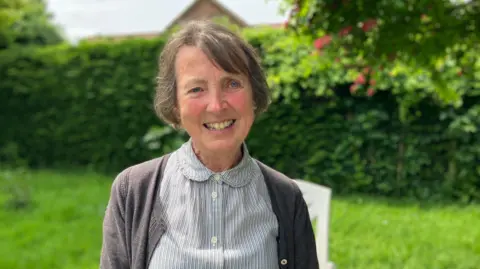
Mr Still could not be saved and his life support machine was turned off the next day, after Ms Clarke agreed to donate his organs.
She says knowing how he felt about the issue helped.
“Richard was incredibly keen on transplants and he used to nag me, ‘what do you want to do?’ and I was a bit wishy washy about it and wouldn’t really answer.”
Mr Still’s kidneys went for research and part of one eye – the cornea – was donated.
Ms Clarke says: “I had a lovely letter from the patient, saying what a difference it had made to their life, that they could now see again.
“It made me realise, it made it real.
“I suppose we might glibly talk about transplants, but to know somebody has benefited from it to that degree does make it real and important.”
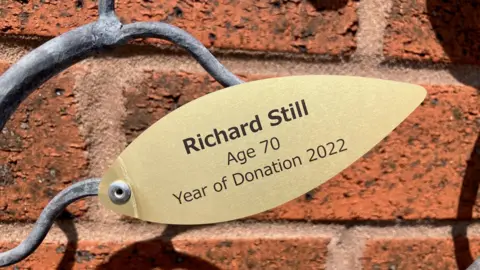
Organ donation laws
An “opt-out” law was introduced in Wales in 2015, followed by England in 2020, Scotland in 2021 and Northern Ireland in 2023.
It means all adults are considered to have agreed to be potential organ donors when they die, unless they have recorded a decision not to donate or are in an excluded group.
The change in law was designed to increase the number of organs available for donation.
But ultimately families have the final say and the consent rate fell to 61% in the 12 months to April, from 69% four years ago.
But why are families refusing to consent to donating a relative’s organ or tissue?
While a loved one’s known views or aspects of the donation process were a factor in many cases, more than one in 10 refusals was the result of families being unclear on how a relative felt about being a donor.
Meanwhile, NHS Blood and Transplant statistics show the number of people who need a transplant has hit a 10-year high.
There were 7,484 people on the active waiting list in March, up 8% in a year.
In the 12 months to the end of March, 418 patients died waiting for a transplant.
And 3,795 patients were temporarily suspended from transplant lists because they were unfit or unavailable.
The waiting list grew despite the number of deceased donors rising 6% to 1,510.
During the same period, the number of living donors dropped 2% to 938.
‘Talk to your family’
Dr Luke Yates, a trustee at the charity Live Life, Give Life, said: “The falling family consent rates are worrying, especially given that the waitlist is at an all-time high, and many of those waiting will die still in need.”
He believes one way to tackle the chronic donor shortage would be to start raising awareness in primary schools.
“Introducing the concept of organ health and transplantation at an early age will facilitate family conversations around donation decisions – a significant factor for families who say ‘yes’ to organ donation.”
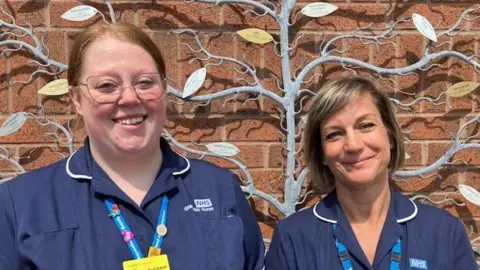
The NHS says families are more likely to support organ donation when a specialist nurse is present.
Ashleigh Robinson is a specialist organ donation nurse based at hospitals in Lincolnshire.
“Sometimes people are very quick to say we’ve had that conversation, we watched a programme and we talked about it,” she says.
“Sometimes relatives don’t know what their loved ones would have wanted so then we explore that, and come to a decision.”
Miss Robinson would encourage families to discuss their wishes, saying: “It just makes that conversation a little bit easier.”
Adele Pavier, lead nurse for the Yorkshire organ donation team, says : “The public often don’t understand that you have to be on a life support machine and in an intensive care bed to become an organ donor.
“It’s essentially about 1% of the population that can become an donor, so you’re more likely to need an organ, than become an organ donor.”
‘A second chance’
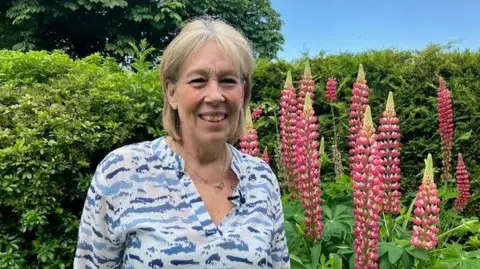
Lynda Sawyer, from Boston in Lincolnshire, received a liver transplant two years ago.
When her skin started itching in 2012, she went to her GP. Tests showed she had primary biliary cholangitis, which can lead to liver failure without treatment.
In 2020, she was told she needed a transplant.
“I think I went into shock, I thought my world had fallen apart,” she says.
“I just sat and cried because I thought I wouldn’t be able to get through it.
“It is a tough, tough world waiting on that list, waiting for your phone to ring.
“And you almost become slightly envious when you hear people have had their call, but you work through that.”
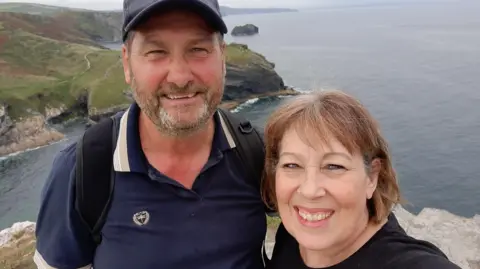 Lynda Sawyer
Lynda Sawyer Mrs Sawyer finally got a call from Addenbrookes hospital on 26 December 2022.
She says: “It was my co-ordinator, Tina. She said, ‘Hi Lynda, merry Christmas, do you fancy popping into Addenbrookes?'”
Remembering being taken to theatre, she adds: “My husband was running after the trolley and they told him he had to say goodbye to me, and he was in tears.
“I started to cry, but then I thought, ‘I haven’t got time to cry’.”
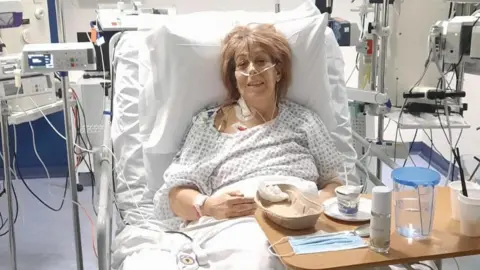 Lynda Sawyer
Lynda SawyerThe operation was a success and Mrs Sawyer’s liver function tests were back in the normal range after just nine days.
She believes organ donation rates could increase, if people talked about the issue more, saying: “It’s not a solemn thing for families to discuss.
“Without my donor and his family agreeing to share his wishes, my life would be very different, my family’s life would be very different now.”
“This is my second chance in life, and I cherish every moment and I cherish my new liver.”
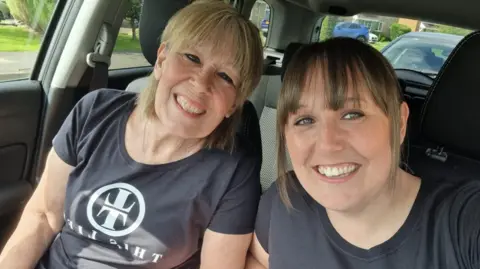 Lynda Sawyer
Lynda SawyerFiona Loud, policy director at Kidney Care UK, said: “By having a conversation about your organ donation decision, you can give your loved ones reassurance and confidence that they are acting on your wishes should the worst happen.
“Think of it in the same way you would making a will – recording what you would like to happen, and the legacy you want to leave behind.”
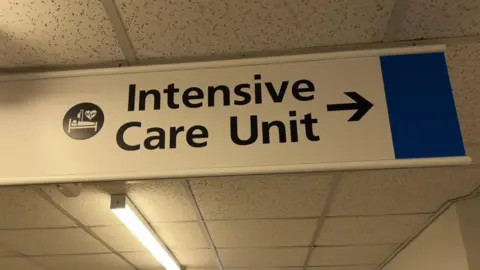
In a statement, NHS Blood Transplant said: “The Covid-19 pandemic heavily hit donation and transplant initially, so it has taken time for donation and transplant to recover.
“Since the change in organ donation legislation, opt-in registrations on the NHS Organ Donation Register have steadily increased to more than 28 million people in the UK, which is encouraging.
“However, opt-out legislation is not the sole answer to improving organ donation.
“We will continue to work with our partners and communities to deliver empowering initiatives which motivate individuals to register their decision.”
Additional reporting by Jonathan Fagg
Related
Youth football teams hold minute’s silence for 10-year-old Poppy Atkinson
Youth football teams and grassroots clubs across the country have held a minute’s silence at the start of their games to commemorate a 10-year-old girl who di
Girl’s death sparks minute’s silence at football matches nationwide
10-year-old Poppy Atkinson was killed when she was struck by a car during a training session at Kendal Rugby Club in Cumbria. Clubs from Leeds to London
Liverpool fans’ Uefa claim can be heard in England, judge…
The high court, sitting in Liverpool, heard Uefa had relied upon the principle that English courts will not inquire into the legality of actions by foreign gove
Alan Shearer’s Premier League predictions including Manchester United vs Arsenal
Caption: Alan Shearer?s Premier League predictions credit: Getty / Metro After some impressive results for English sides in Europe the focus is













